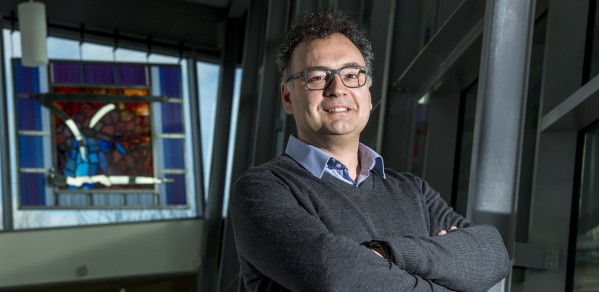
George Malliaras, the Prince Philip Professor of Technology has been awarded an honorary doctorate from Linköping University.
My team is very interdisciplinary – scientists, engineers and clinicians all interested in interfacing electronics with living systems. Our aim is to understand the fundamental processes that take place at the abiotic/biotic interface and to develop better tools for healthcare.
Professor George Malliaras
George is one of the pioneers of organic electronics and has been researching the field for over 25 years. Organic electronic materials can act as a bridge between the digital and the biological world and research has resulted in soft electronics on paper, as batteries and in bioelectronics. Bioelectronics deals with the interfacing of electronics with living systems. George's contribution to the research includes both studies of the properties of the materials and a variety of applications in medicine and printed electronics. For almost 20 years he has collaborated with Linköping University.
An interview with Professor George Malliaras:
Please tell us about your career path to date.
I did my undergraduate studies in Greece, then moved to the Netherlands for my PhD. I did a postdoc at the IBM Almaden Research Centre in California, then started my own lab at Cornell University in New York, where I spent 11 years in the Department of Materials Science and Engineering. I then moved to France to start the Department of Bioelectronics in the Provence campus of the Ecole des Mines de St Etienne. I stayed there 8 years before joining the Department of Engineering in Cambridge in 2017.
Can you give us a summary of your engineering role?
I hold the Prince Philip chair of Technology and lead the bioelectronics laboratory. The team is very interdisciplinary – scientists, engineers and clinicians, all interested in interfacing electronics with living systems. Our aim is to understand the fundamental processes that take place at the abiotic/biotic interface and to develop better tools for healthcare.
What inspired you into your field?
I was writing my tenure proposal at Cornell and was looking for a new research direction. I was working on organic semiconductors for electronics at the time but wanted a new challenge. I attended a seminar on healthcare applications of electronic materials, and was instantly hooked.
How did you first get involved in your specialist area?
Switching research directions was not easy – it took a while to establish enough "street credit" in the new area and be able to attract significant funding. People get associated with a research area and it is difficult to break free. The move to France gave me an opportunity to shed the old work and focus exclusively on bioelectronics.
What contribution to your field are you most proud of and why?
The language used to describe the fundamental processes in bioelectronics is based on electrochemistry. Unfortunately, this language is not suitable for describing sophisticated electronic devices. Together with Professor Magnus Berggren of the University of Linköping, I have been promoting a description based on the language of semiconductor devices. This has helped establish a better understanding of how to go about optimising bioelectronic interfaces, and has led to significant improvements in device performance that have aided their clinical translation.
What aspect of your job gives you the most satisfaction?
Interacting with students is the fun part of the job. Teaching is instantly rewarding while discussing research with my group members is always inspiring, their enthusiasm helps keep me young. I enjoy their successes very much: When a postdoc gets a faculty position, I go home and open a good bottle of wine.
What is the most unique or interesting thing about your work?
At the moment when a significant new finding comes out of your research, you realise that your team is the only one in the world who understands this. This is a unique feeling.
What impact do you hope your work will have on the world?
I hope that technologies that come out of my lab will help restore functional deficits caused by disease. I know that in terms of cumulative impact this will be achieved by students who trained in my lab and are now leading their own research groups.
Please could you describe a pivotal moment in your career.
When I met my wife, a biochemist who became my closest collaborator for several years. She helped me transition from electronics to bioelectronics.
What do you see as being the next big thing in your field?
The use of electricity to treat cancer is an emerging theme that I believe offers tremendous promise. Bioelectronics has yielded a great deal of understanding on how electricity affects cells and tissues of the nervous system and this led to the development of implants that treat the symptoms of Parkinson's disease. This brings a unique perspective in the fight against cancer and a new modality for intervention.
What advice would you give to someone who is considering a career in Engineering?
It's a great career that offers many opportunities. You can have significant impact, much more than in other professions. Keeping a balance between work and life is very important – engineering is so exciting, it tends to draw you in. We live once, so don't forget to live as well.

